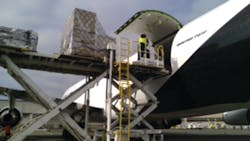The proper use of ground support equipment and safe operating practices are absolutely vital for success and continued growth in our business. Here are three reasons why proper behavior while operating GSE is so important:
EMPLOYEE SAFETY
Every year, literally hundreds of people worldwide are injured, some critically, in GSE accidents. We don’t hear about most of these accidents because they are not highly publicized. But we know they do happen.
The equipment we use is vitally important to the job we do on a daily basis. It can, however, be deadly, if used in a careless manner. Much of it is large and very heavy. It does take much for what seems to be a small incident to cause a big injury or worse. We all have seen or maybe experienced an injury or an accident that was caused by carelessness with GSE equipment. People have lost body parts, people also have been killed in our industry due to carelessness and not operating equipment properly and in a safe manner.
The environment in which we work can also be very dangerous at times. The correct attitude, safe work practices, and attentiveness make all the difference between a good day and a very bad one. No one wants to get hurt on the job or live with the guilt of causing a severe injury to a coworker.
EQUIPMENT DOWNTIME
When a piece of ground support equipment is broken due to negligence, abuse or horseplay, the loading operation must go on minus that piece of equipment. This makes the day’s work harder and more stressful on everyone involved. Even worse, it could cause an aircraft delay. Believe me; if you get enough of those, you won’t have to worry about being short on equipment anymore. You won’t have a contract to use them on!
COST
Ground support equipment is very expensive, whether purchased new or otherwise. Many of the replacement parts needed for this equipment are specialized. They can only be procured from the equipment manufacturer. This naturally makes them expensive.
On top of this there are labor costs to consider. Good GSE technicians are in short supply. Many companies do not have enough of them on staff due to this shortage. This means there may be a backlog of broken equipment while the GSE technician struggles to catch up.
Because of this, an experienced and trained technician is paid pretty well. Imagine trying to work an operation to load an aircraft everyday with only half of your staff – you get the idea.
Let’s pretend for a moment. You and your buddy are sitting on a running baggage tug. You rev the engine until the governor kicks in, and then slam it into gear. The tug jumps forward with the front wheels clawing at the sky. Pretty fun, right?
You do it a few more times and then something different happens. The tug jerks to a stop with a loud metallic clanking coming from under the rear of the machine. You tell your supervisor and he has the unit towed to the shop.
Within an hour the GSE mechanic has to tell the station manager that the rear axle assembly is shelled out. Almost none of the parts are reusable, so a new one must be purchased. The cost, you ask? A new Rockwell axle assembly runs several thousand dollars. Then you have the cost of labor and supplies to install it. So, you purchase the part, pay to have it shipped (it is heavy), and pay to have it installed all because someone thought it would be fun to pop some wheelies. After enough of these incidents, then the financial bottom line of the station is very negatively affected.
Let’s all work together to ensure the continued success of our industry and ourselves by being safe, aware of our surroundings, and respecting the resources our company has provided. Without equipment being operated in a safe manor it can cause the equipment to have ongoing operation problems that eventual will end up destroying the equipment.
(This was written from two people one being in operations and one being in GSE. Both know the impact and the bottom line that this type of abuse can do to GSE.)
About the authors: Kenneth DeVolpi, manager of sales and marketing and special projects manager, has worked for Matheson for more than three years and has been in the aviation industry for more than 20 years, including 15 years with Northwest Airlines. Jason Chapman works in the company's GSE maintenance department and gained GSE mechanical experience with the U.S. Air Force and has worked in the commercial GSE industry for 12 years.





